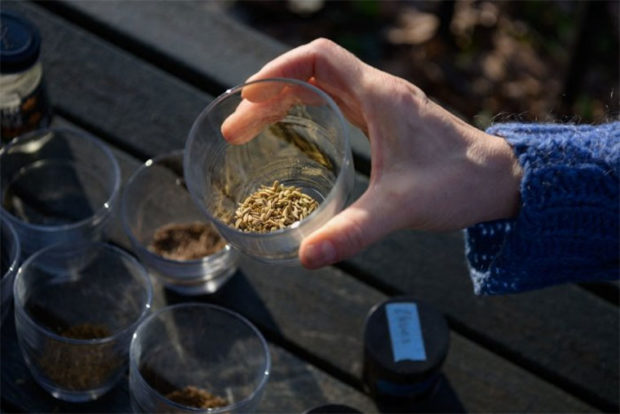
Everything tasted like cardboard: Anguish of Covid-19 survivors
PTI, Mar 28, 2021, 2:55 PM IST

Three days after testing positive for Covid-19, “everything tasted like cardboard,” recalls 38-year-old Elizabeth Medina, who lost her sense of taste and smell at the start of the pandemic. A year later, she fears she will never get them back.
Medina consulted ear, nose and throat doctors and neurologists, tried various nasal sprays, and is part of a group of patients undergoing experimental treatment that uses fish oil.
To try to stimulate her senses, she puts copious amounts of spices on everything she eats, pours aromatic herbs into her tea and regularly sniffs a bracelet soaked in essential oils.
But her attempts have been in vain. Medina, a guidance counselor at a New York school, says she has lost many everyday pleasures she once enjoyed, including eating and cooking.
She says she has cried every day for months.
Medina is one of a growing number of people with lasting anosmia — a poorly understood disorder that has become an underestimated consequence for many in the pandemic.
Most Covid-19 sufferers who lose the ability to taste or smell recover “within three or four weeks,” according to Valentina Parma, a psychologist at Temple University in Philadelphia.
But 10 to 15 per cent lose the senses for months, said Parma. She chairs the Global Consortium for Chemosensory Research (GCCR), which was formed at the start of the pandemic to study the problem.
Sensory loss is estimated to affect more than two million Americans and 10 million people worldwide, according to the expert.
Taste and smell are often seen as less essential than sight and hearing, and their loss is often considered as less serious than other effects of “Long Covid”; but they are a key part of socialization, says Parma, noting that “we pick mates based on smells.”
Their disappearance, moreover, is frequently compounded not just by nutritional problems but by anxiety and even depression, Parma added.
Like other “anosmics,” Medina found solace and solidarity in a support group organized by a hospital near her home.
Such groups have flourished on social networks. The AbScent group, formed as a charity in Britain in 2019, has seen its members on various platforms soar from 1,500 to more than 45,000 since the pandemic began, according to founder Chrissi Kelly.
On the organization’s main Facebook page, the question that haunts Medina repeatedly comes up: “Will I ever regain my sense of taste and smell?”
At this stage, said Parma, “it is quite difficult to predict how things will evolve.”
But there is one good indicator that anosmics are on their way to recovery: developing parosmia, when people’s smells of familiar things are distorted, like smelling garbage while sniffing coffee.
Presently there is no known cure, and the only treatment recommended without reservation is to smell four different scents twice a day. According to Parma, this works in 30 percent of cases, but only after three to six months of practice.
Faced with this uncertainty, it’s perhaps no surprise that the likes of AbScent’s Kelly, who lost her taste and smell after a bout of sinusitis in 2012, and Katie Boateng, an American who lost the senses in 2009, have become near-celebrities.
They share their experiences, and push the medical community to intensify research and recognize the seriousness of their symptoms.
In 2018, Katie Boateng created the Smell Podcast, a mine of information and advice for her companions in misfortune.
She is now part of a patient advocacy group that helps guide GCCR’s research.
Although Boateng has given up hope of being cured herself, “I am still very hopeful that we can lead to research that can cure people in the future,” she said.
While waiting for a medical breakthrough, many continue to perform their daily sniffing exercises, sometimes with the help of a coach, like Leah Holzel.
The food expert, who had lost her sense of smell from 2016 to 2019, has helped six people recover from anosmia since the start of the pandemic.
Many sufferers also cling to messages about improvements or healings that appear regularly on social networks, enjoying the camaraderie that the groups provide.
“It’s almost exactly a year after I first lost my smell and taste and I’m pretty much okay now,” Dominika Uhrakova, who lives in Southampton, England, wrote on AbScent’s Facebook page.
“Hang in there, don’t lose hope and I’m wishing you all best of luck,” the 26-year-old added.
Udayavani is now on Telegram. Click here to join our channel and stay updated with the latest news.
Top News

Related Articles More

Snatcher lands in police net in Delhi, AI tech helps reveal identity

AI Meets Health: The Rise of Smart Fitness Solutions

Power Up by Powering Down: 10 Energy-Saving Tips for Every Home

Multi-lingual AI chatbot to assist visitors during Maha Kumbh Mela 2025

ISRO carries out ‘well deck’ recovery trial of Gaganyaan
MUST WATCH
Latest Additions

Allegation of abuse against K’taka Minister Laxmi: BJP leader C T Ravi booked, taken into custody

Gadag: 2-yo girl dies after being run over by water tanker

Mangaluru Traffic Advisory: Netravathi Bridge repair work to affect vehicle movement

MUDA case: Karnataka HC defers filing of Lokayukta police report

BJP files police complaint against Rahul, seeks FIR under ‘attempt to murder, assault, incitement’
Thanks for visiting Udayavani
You seem to have an Ad Blocker on.
To continue reading, please turn it off or whitelist Udayavani.


















